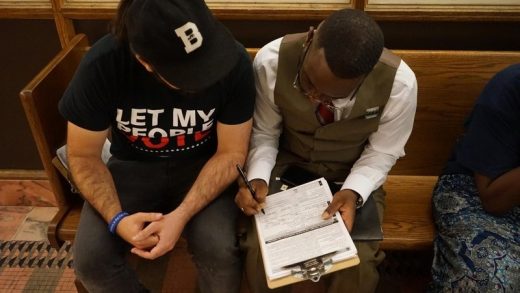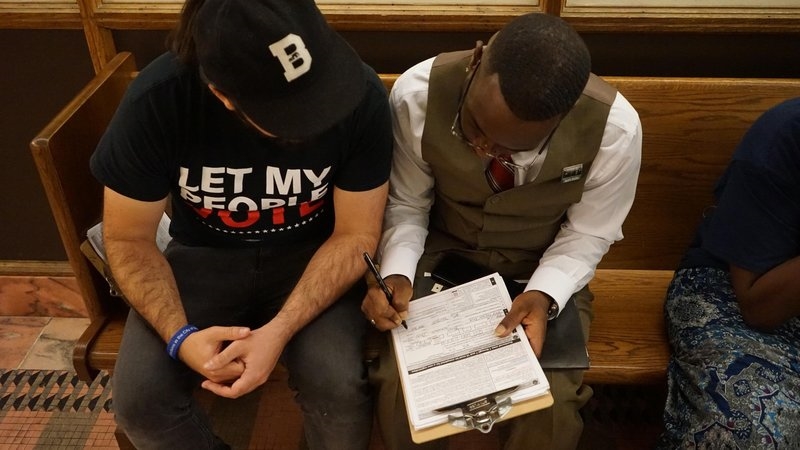How my Facebook post sparked a citizen movement that defeated partisan gerrymandering in Michigan
Wisconsin citizens forced to choose between risking their health during a pandemic or losing their vote. Voting precincts in Milwaukee, a city of nearly 600,000 people, reduced from 180 locations to just five. Voting rights denied to 1.4 million Florida citizens even after 65% of voters expressed support for restoring those rights. Flint, Michigan, plagued by lead-contaminated water for six years.
These seemingly unrelated events all trace back, in part, to a single cause: gerrymandering, a system of predetermining election results through carefully manipulated district boundaries. Gerrymandering effectively allows politicians to pick their voters—rather than voters picking their politicians. So they continue to make bad decisions within a system that protects them from answering to the voters they were elected to serve. Instead of being held accountable for their actions (or inaction), they continue to win elections due to an often-overlooked process of drawing voting district lines that occurs only once a decade.
Gerrymandering is a distortion of representative government that dates back to the early days of our nation. In recent years, the practice has been accelerated by pairing advanced mapping technology with voter-specific data mining. When in power, politicians from both major parties have spent long hours determining the exact combinations of voters that will keep them in power, even if they lose majority support.
These short-term victories have deteriorated voters’ trust in the political system, and their ability to hold elected officials accountable. Gerrymandering, which also eliminates the incentive for compromise between political parties, has been denounced by politicians ranging from Republicans Ronald Reagan and John McCain to Democrats Barack Obama and Eric Holder.
And it is an issue that is increasingly driving grassroots activism nationwide. The highly acclaimed documentary Slay the Dragon, which premiered earlier this month, tracks two of those efforts and examines the challenge of overturning the cliche “you can’t fight city hall”:
? In Wisconsin, elections regularly resulted in the political party that won the most votes ending up with a weak minority in the state legislature, due to gerrymandering. Outraged citizens launched a legal challenge that went all the way to the U.S. Supreme Court—only to fall one vote short of achieving nationwide change.
? In Michigan, similar upside-down election results sparked a citizen movement to accomplish what most “experts” deemed impossible—amending the state’s constitution through a grassroots petition drive that lacked any support from the political establishment. Along the way they overcame the indifference that hampered other political reform efforts, collecting more than 425,000 petition signatures on a shoestring budget. They even defeated a court challenge from a group of powerful incumbent lawmakers and officials who had done the gerrymandering in the state for the past 30 years.
? The Michigan success story has been mirrored by activism across the country. Citizen groups in 24 states are fighting back against an unresponsive political establishment increasingly focused on self-preservation rather than representing the will of voters. Redistricting reforms were passed in Colorado, Michigan, Missouri, Ohio, and Utah in 2018 alone.
? Florida voters approved by a nearly two-to-one margin the restoration of voting rights to felons who had completed their sentences . . . only to be met with legislation from a gerrymandered legislature that added conditions which effectively overturned the will of the voters. The legislation was later blocked in federal court.
? Michigan voters supported by a two-to-one margin a “Promote the Vote” package, which included same-day voter registration and “no reason” absentee voting (vote by mail).
I helped provide the spark for citizen-driven reform in Michigan with a simple Facebook post: “I’d like to take on gerrymandering in Michigan, if you’re interested in doing this as well, please let me know :).” Within a couple of weeks, I heard from hundreds, and then thousands, of my fellow Michiganders who had collectively reached their “Howard Beale moment” (“I’m mad as hell, and I’m not going to take it anymore!”).
We were just your average citizens, with not much of an idea of what we could accomplish or how to do it. But we took on the challenge, facing an intimidating learning curve. Along the way, our core group was joined by people who knew other people who did know what needed to be done and how to do it. Collectively, we crowdsourced the knowledge, resources, and enthusiasm to be able to stand up and assert that we wanted to make sure our government will derive its power from the consent of its governed, not from powerful insiders in smoke-filled rooms.
From the beginning, it was a ground-up effort. At a time when our politicians stopped holding town halls, we held 33 town halls in 33 days in every congressional district in the state at least twice to hear from all concerned citizens. Our proposal was based on feedback from voters who told us about the changes they wanted to see. The initial team that crafted the language of our seven-page proposal included dozens of people from every walk of life. Yes, there were plenty of lawyers. But there were also teachers, retirees, clergy, a birthing doula, and a woodcarver. It was a diverse group of people who shared a strong desire for a system that didn’t treat Michiganders differently based on which political party they vote for.
There were plenty of missteps along the way, but we just kept going. Established good-government groups tried to absorb our campaign and transform it into a top-down decision-making structure. We resisted, ultimately launching our petition drive with no support from the “establishment.” By the time we started collecting signatures, we had thousands of volunteers from every county in Michigan trained and organized. Within 110 days we collected more than 425,000 signatures with an all-volunteer army (much to the surprise of the pundits, politicians, and special interests who opposed us).
The opposition fought our efforts every step of the way, including through legal efforts that eventually wound up in the Michigan Supreme Court. Despite heavy political pressure, the court voted 4-3 in support of the first words in Michigan’s constitution: “All political power is inherent in the people.”
The court’s ruling affirming our position on the ballot broke the dam that had blocked our establishment support. The gang that everyone called naive and delusional now had Arnold Schwarzenegger flying in for a fundraising event, the active endorsements of dozens of nonpartisan reform organizations, nationwide financial support, and most important, the strong conviction that change was possible due to the hundreds of thousands of Michigan voters who had championed getting the amendment onto the 2018 ballot.
Our initiative passed with over 61% of the vote (more than 2.5 million votes). The monumental change launched by a Facebook post and a half-dozen people who met online is playing out now. Fortunately, we have a supreme court, governor, attorney general, and secretary of state who are working on behalf of the law and the people of our state, even as our gerrymandered legislators continue to try to sabotage the proposal in federal court.
The secretary of state is now in the process of setting up the first Independent Citizens Redistricting Commission to draw congressional and legislative district lines. The battle we began in 2016 will finally play out in the 2022 election when new district maps go into effect. No matter how those maps impact the makeup of our legislature and congressional delegation, we’ll be satisfied because elections were decided by the will of the voters and not partisan mapmakers. That’s why I’m proud to support Participant and Magnolia Pictures on their “Slay the Dragon” campaign, which aims to increase awareness around gerrymandering and get even more citizens engaged in the redistricting process, especially in Michigan.
I used to feel like I was the only one who cared about the root causes of our governments’ continued failure and corruption, and then I made a Facebook post that ended up connecting me to thousands of other people who were feeling the exact same way. Together we learned that not only did we have far more power than we had realized, but that we actually could change our government to protect ourselves and future generations. Now, the good governance reform efforts of Voters Not Politicians continue in Michigan, and we are connecting nationally with concerned citizens through a new organization called The People.
As citizens, we learned together that the impossible was indeed possible. But you have to take the first step.
Katie Fahey is executive director of The People, a national nonprofit that gathers and empowers everyday Americans to find common ground and take action together to create a government that is responsive and accountable to all its people. She is featured in the recently released documentary Slay the Dragon, which has been hailed as “the most important political film of the year.” Follow the People on Twitter @ThePeopleOrg. Slay The Dragon is now available on demand.
(6)



